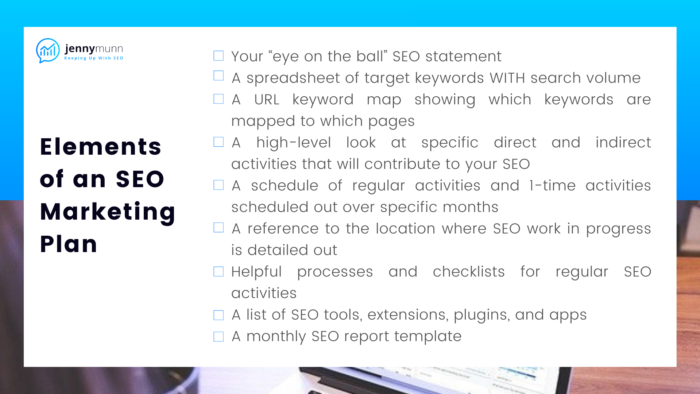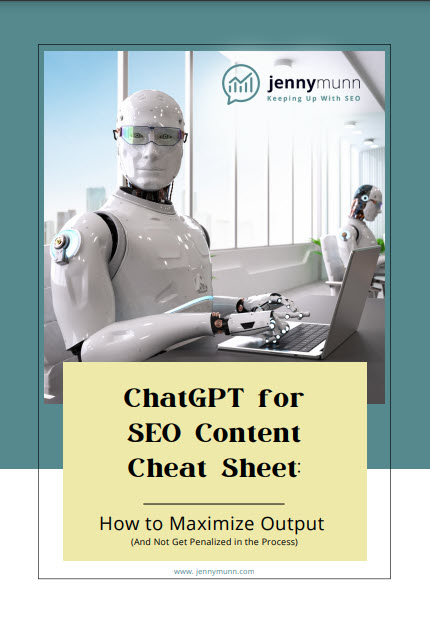Imagine going back to the olden days of the 1980s, 90s, and 00s. The days when we’d print every single document. When we had 3-hole punches and we’d actually put papers into 3-ring binders. Before minimalism, Dropbox, Marie Kondo, and killing trees was a thing.
I want you to think of your SEO Marketing Plan as if it were a neatly organized 1” binder organized by labeled tabs and hole-punched papers.
Can you picture it?

Now, let’s start with the basics of why this is the best way to create your SEO marketing plan.
What is a Marketing Plan?
A marketing plan is a high-level report that outlines your marketing strategy. It typically is comprised of:
- An overview of business goals
- A description of the business’s current position, industry, and landscape
- A timeline of when tasks will be completed
- KPIs to track
- A description of the business’s target market and customer needs
If you Google “marketing plan template,” under Google’s Image search, you’ll see an abundance of spreadsheets, PDFs, images, flow charts, checklists, and PowerPoints.
A plan is important so you know where you’re heading, why, and how you’re going to get there. But for an SEO Marketing Plan, we need to put a twist on it.
What is An Operations Manual?
According to Process Street, an operations manual is “the encyclopedia for your business.” It’s what you hand the new employee on the team to get them up to speed on your organization, culture, and the ins and outs of how they’ll do their job.
What is An SEO Marketing Plan?
If you combine the principles of an Operations Manual with those of a Marketing Plan, you’ll get exactly what you need for a first-class SEO program.
Essentially, your “SEO Marketing Plan” should be your SEO Operations Manual. And here are the elements that your plan should include:
- Your “eye on the ball” SEO statement
- A list or spreadsheet of target keyword WITH search volume
- A URL keyword map so you know what keywords are mapped to which pages
- A high-level look at what direct and indirect activities will contribute to your SEO
- A schedule of regular activities along with 1-time activities scheduled out over specific months
- A list of tools you use for SEO
- Helpful processes and checklists
- A monthly SEO report template
SEO Marketing Plan Example and Tips?
Most of this should be relatively self-explanatory. Let me give you just a few tips and examples of each of the components above.
Your “eye on the ball” SEO statement
- If you’re just getting started, begin by defining your SEO direction. I wrote all about how to identify this quickly, and establish your “eye on the ball” overarching SEO objective. After you have determined your “eye on the ball,” your SEO marketing plan will continue to fall in line.
A list or spreadsheet of target keyword WITH search volume
- A list of keywords only with no accompanying monthly search volume is unacceptable, soldier. We need to see keywords with proven search count to ensure these are terms your target market is actually searching. Not terms that your business wants to be searched (that actually aren’t), nor terms that you made up in your head.
A URL keyword map so you know what keywords are mapped to which pages
- A URL keyword map is a little more advanced. If you don’t have this initially it’s ok, but it is absolutely something you should work towards.
A high-level look at what direct and indirect activities you will do that will contribute to your SEO
- Do you have a documented integrated marketing plan or calendar? That should suffice. If not, here is a link to my 12-month SEO Action Plan template, which explains what this is and how to make sure you’re moving the needle for SEO.
A schedule of regular activities along with 1-time activities scheduled out over specific months
- SEO cannot be done all at once. What you need to do will be dependent on the relevance and level of effectiveness of your SEO Foundation, along with industry SEO nuances and competition level of your keywords, and savvy with the other websites you’re competing against
A reference to the location where you record SEO work in progress with detailed notes
- If you could use some help getting more organized with SEO and SEO project management (critical in today’s world), I suggest you check out my free 5-day How to Master SEO course. Day 3 is where I go over how to double your efficiency by being more detailed with your day-to-day projects.
A list of tools you use for SEO
- I don’t’ know a single marketer who isn’t eager to learn about amazing new tools that help us do our job faster. Hopefully, you have a nice arsenal of SEO tools at your disposal that you can include in your SEO Marketing Plan. If you need a few more ideas, you can check out some of my favorite SEO tools here.
Helpful processes and checklists
- I have become such a proponent for documenting processes and creating handy checklists. Not only for yourself, but to disseminate to your team to keep everyone on the same page about consistently ensuring SEO is being factored into the multiple channels. My top SEO Process document I always recommend, is for on-page SEO (how to optimize content specific to your CMS, branding, etc.).
A monthly SEO report template
- Your SEO monthly report will be very custom to your organization, who needs to see it, and what needs to be reported on. And of course, what tools you have at your disposal and how aggressive your SEO and content initiatives are. To get an idea, you can check out the Google image results of an “SEO Reporting template.” At a minimum, here’s what I suggest including in your report.
And that will complete a well-rounded SEO marketing plan. Do you have anything to add?

Jenny Munn
Latest posts by Jenny Munn (see all)
- Four 2024 SEO Planning Tips for World Domination - November 16, 2023
- SEO Planning Tip: Why You Need a CYA Clause - November 3, 2023
- How Long Does SEO Take to Show Results? (Updated for 2023) - August 9, 2023


